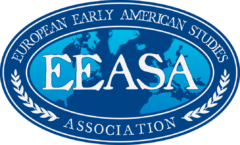What is the Naomi Wulf Prize?
The Naomi Wulf Prize is named in honor of Naomi Wulf (1964-2012), Professor of Early American History at the Sorbonne-Nouvelle and one of the founders of EEASA.
The prize is awarded in the wake of every bi-annual conference. It entails specific consideration for publication in the JEAH (after the usual review process), a cash prize of 500 Euros, plus a one-year free subscription to the Journal of Early American History.
The prize is awarded to a participant of the most recent EEASA conference on the basis of the written version of the paper as submitted prior to the conference.
As the written version of the paper is submitted, participants who wish to be candidates for the prize will indicate their candidacy to the secretary. The selection process involves the EEASA board and one member of the JEAH editorial board.
The prize is awarded within four months after the conference and announced on the EEASA and JEAH websites.

Naomi Wulf Prize Poitiers 2021
We are pleased to announce that the Naomi Wulf Prize 2021 has been awarded to Derek Kane O’Leary, post-doctoral fellow in the History Department of the University of South Carolina, Columbia, for his essay entitled ‘Scandinavian archives, Trans-Atlantic Historical Culture, and Carl Christian Rafn’s Attempt to Rewrite American History in the Antebellum U.S‘.
Many congratulations!
The prize entails specific consideration for publication in the JEAH (after the usual review process), a cash prize of 500 Euros, plus a one-year free subscription to the Journal of Early American History.
Past recipients
Matteo Lazzari (Università di Bologna): “Mulattoes’ Identity in the Early Iberian Atlantic: The Case of Gaspar Riveros Vazconcelos Between Mexican Inquisition, Politics and Astrology.”
Julie M. Savalastog (Leiden University): “The Merging of the British East and West India Trading Companies in the Mid-Seventeenth Century.” Published as Svalastog, J.M. (2019). Challenging Porous Frontiers: Atlantic merchants and the potential of the Indian Ocean, 1640–1650, Journal of Early American History, 9(2-3), 145-162. doi: https://doi.org/10.1163/18770703-00902011
Lublin 2014 “Protest and Persuasion: Writing, Print, Speech and Performance in Early America and the Atlantic World”
Claire Bourhis-Mariotti (Université Paris-8, France): “Haiti as Lieu de Mémoire of Black Nationalist Protest and Persuasion in the Antebellum Period: African-American Emigration to Haiti, 1855-1862”
Charlotte Lerg (Ludwig-Maximilians-Universität, Munich, Germany): “Imagery of Protest: Performative Protest Culture in Political Cartoons of the British Atlantic 1760-1790.” Published as Lerg, C. A. (2018). Transmediality of Protest: Performative Protest Culture and Political Caricature in the British Atlantic, 1760–1780, Journal of Early American History, 8(2), 103-121. doi: https://doi.org/10.1163/18770703-00802001
Elena Schneider (then Omohundro Institute, VA, now University of California Berkeley, CA, USA): “Imperial Imaginings in the Spanish Atlantic During the Era of the Seven Years’ War.” Published as Schneider, E. (2015). African Slavery and Spanish Empire, Journal of Early American History, 5(1), 3-29. doi: https://doi.org/10.1163/18770703-00501002
